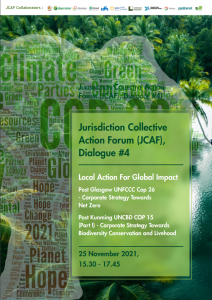EXECUTIVE SUMMARY
Jurisdiction Collective Action Forum (JCAF) held its virtual Dialogue #4 on 25 November 2021. The forum focuses on this year’s most anticipated global events, the UNFCCC COP 26 in Glasgow and UNCBD COP 15 (Part 1) in Kunming, which brought in the business sectors’ perspectives and their strategy towards achieving net-zero goal and biodiversity conservation, as well as community livelihood. The dialogue of the two prominent summits sought to discuss Southeast Asia’s potentials as a pivotal contributor to the global climate and biodiversity value proposition, particularly as a major producer of agricultural and forestry outputs.
In line with the Indonesian government’s decade of achievement and strong commitment to continue in bending the curve of deforestation, as stated by President Joko Widodo at COP 26, business leaders have proactively stood firm to their commitment to do more than just pledging, but to also translate that pledge to their supply chain operations. Further strengthening conservation programs, traceability and supply chain mapping, renewable energy investments, and sustainable forest management systems are critical models of actions for leading cross-sectors commodities in their pursuit toward climate agenda. The wide array of cross-sectoral actors from financing, rubber sector, and restoration ecosystems collectively outline their strategies and actions to integrate biodiversity conservation and community empowerment into their business models while making financial calls to scale it up.
The fourth JCAF dialogue concluded that business leaders had outlined their actions to contribute to achieving the climate-action agenda as reflected at the UNCOP 26 and UNCBD Cop 15. However, involving financial sectors is critical to unlocking economic opportunities to leverage current silo/ecosystems/project-based activities and synergize with local governments, who sit at the helm of cross-sector, multi-stakeholder collaborations. Therefore the session recommended developing business cases to identify shared-lessons learnings and potential opportunities for scalable solutions in leading jurisdictions, contributing to the implementation measures and action plans toward climate-solution agenda in the next COP 27.
